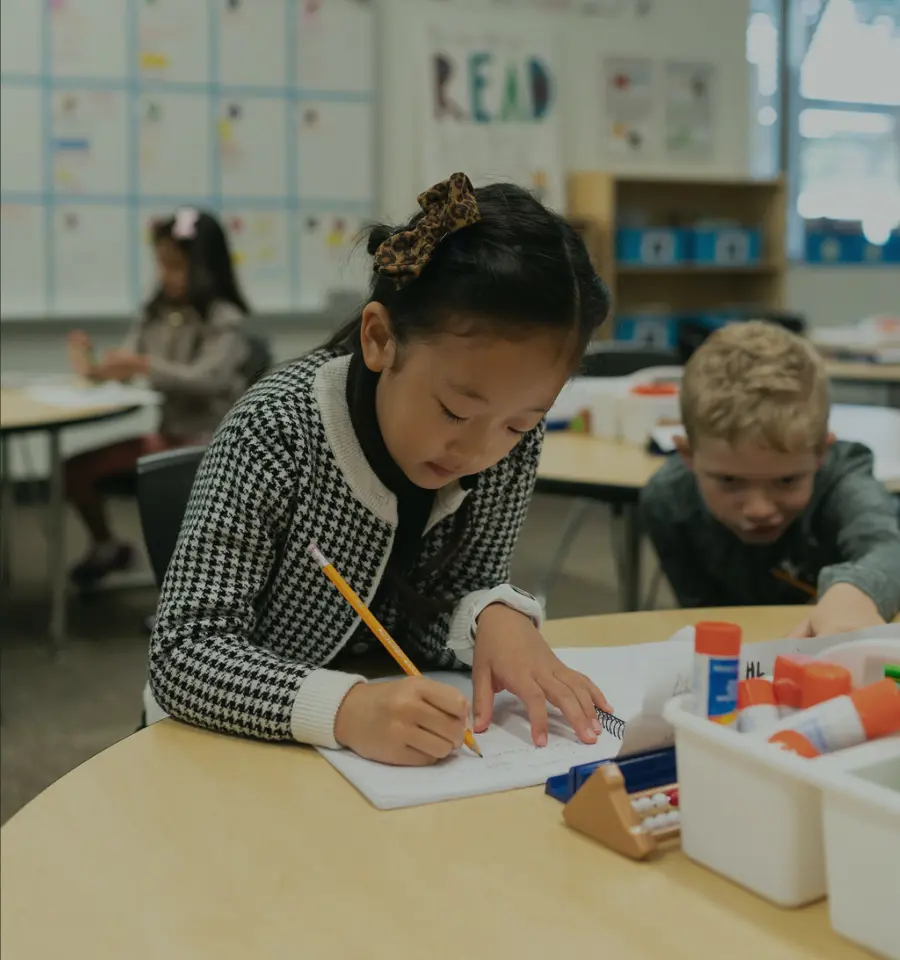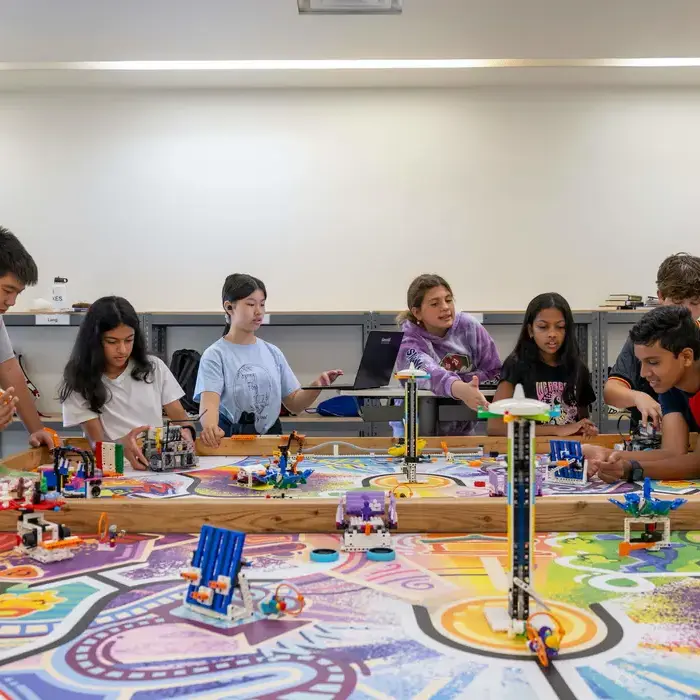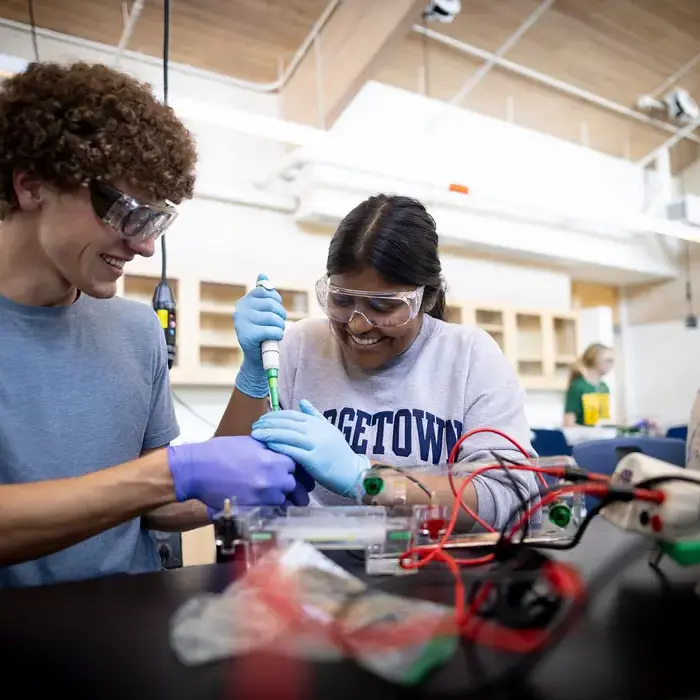The Rosa O. Valdes STEM + Innovation Center
Our new, state-of-the-art 65,000-square-foot facility houses science, math, engineering, technology, and robotics classes for Middle and Upper School students.
Points of Interest
MARSHALL FAMILY COMMONS
The Marshall Central Commons serves as a gathering space for the campus. Students mingle, work together, and create connections with faculty in the main lobby area, which includes the commons staircase, the commons lounge, and coffee shop.
CATALYST COFFEE & COMMUNITY SPACE
The Catalyst Coffee Shop & community space provides a welcoming entrance to the Rosa O. Valdes STEM + Innovation Center. It serves as a light-filled gathering space for students and faculty with views onto the Foote Quad and the Rosa O. Valdes STEM + Innovation Center and Innovation Lab near the lobby.
INTERIOR COURTYARD
The interior courtyard is nestled near the center of the building, bringing natural light to the Marshall Family Commons and surrounding classrooms on both floors. This courtyard provides space that offers hands-on education to students from all divisions. It serves as a bridge between generations as it honors the courtyard in the original Agnich Science Building.
MATH PROJECT SPACE
The math project space is a dedicated space for long-term, complex, collaborative math projects and experiments. Students use this space to engage in projects over a longer period of time, deepening their learning and strengthening their skills.
EXTENDED EXPERIMENTS SPACE
The extended experiments space is a dedicated room for experiments that require longer than a class period to demonstrate results. These multi-phase experiments enhance the learning process for students and offer greater opportunity for individualized learning through capstones and other extended projects.
SCIENCE LABS
Science labs are large, flexible spaces where Middle and Upper School science courses take place. Students learn the fundamentals of these subjects through an experiential curriculum in spaces designed to accommodate all labs and learning opportunities.
MATH LAB
The math center serves as a dynamic learning space where students can seek help from teachers or more experienced peers. The space fosters a creative, collaborative approach to problem-solving, deepening understanding and encouraging discussions around math.
MATH CLASSROOMS
Math classrooms are spacious, light-filled rooms where algebra, geometry, calculus, and all other math courses take place, allowing for student collaboration and experiential learning opportunities.
FACULTY WORKSPACE
The faculty workspace serves as a hub of connection, collaboration, and inspiration as colleagues from across departments and divisions work side-by-side in a shared office space.
- Faculty Reception: A welcoming space located near the top of the commons staircase, the faculty reception area serves as the entrance to the faculty workspace and conference rooms.
- Faculty Meeting Spaces: Faculty conference rooms, breakout rooms, and booths offer teachers small-group collaboration spaces or a quiet space for focused work.
Innovation Corridor
The Innovation Corridor is a hub for the new Design & Innovation Lab programming and industry-relevant student work. It includes a collaboration space, production studio, fabrication lab, robotics studio, computer science rooms, and high nay. All students in grades 5–12 have the opportunity to engage in real-world problem solving within these walls. A lab manager assists students working on individual projects, teaching them how to use the equipment and helping them explore their passions.
COLLABORATION SPACE
The fabrication lab is where student work literally takes shape. Hand tools, laser cutters, 3D printers, and CNC machines help students move from simple prototypes to fully functioning solutions for themselves and their industry clients.
FABRICATION LAB
The fabrication lab is where student work literally takes shape. Hand tools, laser cutters, 3D printers, and CNC machines help students move from simple prototypes to fully functioning solutions for themselves and their industry clients.
EXPLORATORY HIGH BAY
The high bay in the Innovation Lab provides dedicated space for students to work on larger and longer-term complex projects. Whether students are designing and building robotic equipment or working on converting an automobile to autonomous, in this space, students are inspired to push boundaries and explore.
PLAZA
The plaza is the outdoor extension of the Innovation Corridor. With floor-to-ceiling doors, the space allows students and faculty members to easily move the classroom outside. Testing prototypes, experimenting, and other engaging activities all take place in this space. The plaza also serves as a gateway to the athletic fields and parking areas on the western side of campus. The area is traversed daily by students, employees, families, and guests.
PRODUCTION STUDIO
The production studio is a central hub for the Design & Innovation Lab. Flexible design of the furniture and equipment allows students to bring all of the pieces of their solutions together. Whether they are assembling their custom-printed circuit board at one of the five electronics workstations, integrating the motor drive to their 3D printed autonomous machine, or putting the final touches on their conceptual prototypes for UX testing, this space supports all students whether they are in a class or just wandering in to explore during their free time.
ROBOTICS LAB
The robotics lab is designed for the assembly and integration of various robotic systems. Initially, this space supports US First competitions and Greenhill robotics teams. In the future, Currently, this space will also support the expansion of the robotics program.
Architectural Features
MASS TIMBER
The Rosa O. Valdes STEM + Innovation Center incorporates a mass-timber structure, not only in the columns and beams, but also in the ceiling and floor. This sustainable building material mirrors other buildings on Greenhill’s campus, such as the Montgomery Library. It is best featured in the Marshall Family Commons.
EXTERIOR WALLS AND GLASS
The brick wall on the south face of the building has a mathematical constant encoded to create texture and a series of openings for air and light. The bird frit pattern, designed to prevent bird strikes, was determined by a specific number sequence, that despite its simple rules, has applications in fractals, set theory, and vector graphics.
SOUTH CLASSROOMS
The south classrooms are located between the existing Phillips Family Athletic Center and the Levy Middle School. They feature a charred wood siding and exterior circulation like other spaces on campus. The south-most wall of this wing incorporates a mathematical constant in the design of the brick.
WEST ELEVATION
The sawtooth roof line that is visible on the west side of the building brings daylight to interior spaces and provides a roof line that can support future solar panels. The shaped window frames with vertical shading fins will control solar heat gain and glare in the classrooms. The gateway from the parking lot to the plaza provides access to the rest of the Greenhill campus.
WATER TANK
The water tank outside of the Rosa O. Valdes STEM + Innovation Center was restored to collect stormwater to irrigate the building's landscaping. Seniors have painted the exterior of the tank for decades, and this beloved tradition will continue, uniting the past and the present.
STORM SHELTER
The storm shelter under the building is designed to protect the building’s occupants in the event of severe weather. It is 5,842 square feet in size; has capacity for more than 1,000 people; and includes running water, toilets, showers, and fresh air flow. The shelter will withstand the weight of the building, and its construction required digging 12 feet down into solid limestone.



